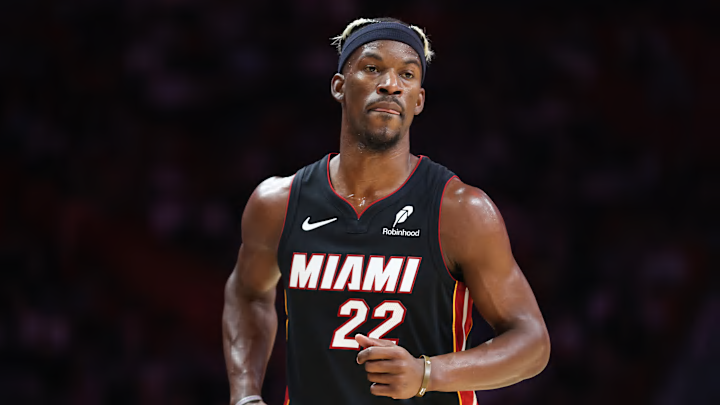Jimmy Butler is one of the NBA’s most unique personalities—a player known as much for his trash talk and iconic haircuts as for his on-court brilliance. From brewing coffee in the Orlando Bubble to rocking custom Phoenix Suns-themed shoes (a hint for his trade target), Butler’s creativity and flair stand out. But his recent suspensions—a seven-game ban followed by two additional games for skipping a team flight—hint at deeper tensions between him and the Miami Heat management.
While analysts speculate the trade saga is rooted in money disputes—such as contract extension disagreements or rumors of delayed summer payments—it’s clear the story goes deeper than financial incentives.
Yes, money is a motivator for any player, but history has shown that some, like Dirk Nowitzki, were willing to take pay cuts to strengthen their teams. Could Jimmy be the same, or is there something else driving this rift?
A glimpse into Jimmy Butler’s world.
Butler’s recent Netflix series, Starting 5, which features him alongside four other NBA stars, offers rare insight into his life off the court. The documentary highlights his many talents, from music to dominoes, but also reveals his deep connection with his father.
Without spoiling too much, the series portrays his father as an ultimate inspiration for his basketball career—a figure Jimmy was fiercely loyal to and who shaped his competitive edge. This personal lens sheds light on why Butler may need more support during challenging family circumstances.
It’s clear from the documentary that he’s not just a superstar athlete but also a person navigating life’s complexities. Yet, Miami’s infamous “Heat Culture,” while celebrated for fostering discipline and underdog resilience, might not be the kind of environment that offers the support he needs right now.
The Miami Heat culture—adapt or leave.
Dwyane Wade, a Heat legend, famously explained the Heat Culture as a sink-or-swim environment and that you either take the Heat way or the highway. After winning two championships in Miami, even LeBron James eventually chose the highway back to Cleveland, seeking a team dynamic more aligned with his needs.
For Butler, who carried the Heat to two Finals appearances as an underdog leader, the situation is particularly complex. He’s proven his worth to the franchise, but the lack of soft skills within the Heat’s management may be fueling the current standoff.
Butler’s fiery personality is part of what makes him an elite competitor, but it seems to clash with Miami’s hardball approach—especially during a personally challenging time in his life.
Jimmy Butler is a superstar caught in the system.
This trade saga feels less like a purely sports-related issue and more like another example of how the NBA treats its players. Teams often treat their stars as cash cows, expecting them to adapt at all costs while failing to offer the personal support they might need.
Butler’s situation is a reminder that even superstar athletes are human and that cracks appear when management prioritizes control over connection. The league often rewards players like LeBron James, who have mastered the art of adaptation.
Entering his 21st season, LeBron has remained a symbol of longevity and resilience, presenting the image of an athlete who thrives within the system. Butler, on the other hand, has always been a disruptor—challenging the norm and refusing to fit into a mold. This seems clearly to be not supported.
For now, the Heat’s stance seems clear: adapt to their culture or take the highway. But for a player who has given so much to the franchise, it’s worth asking whether Miami might need to meet Jimmy halfway. Meanwhile, the situation remains chaotic, and fans are curious about what the future holds for Jimmy and his future.
